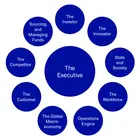Expand your leadership abilities. Solve your organization’s biggest challenges.
The world only gets more complex. To lead at the highest level, you’ll need both an understanding of business functions and of the big-picture strategic challenges. The Yale EMBA combines rigorous business instruction, leadership training, and a unique opportunity to customize your learning around your interests and leverage the resources of Yale University.
EMBA Overview
- An MBA education in a 22-month program
- Gain the essentials for leadership in any industry or sector
- Opportunities to customize the program to your professional interests
- Friday/Saturday sessions on alternate weekends on Yale’s campus
- Four in-residence weeks, including one Global Network Week abroad
The knowledge I’ve gained about leadership and managerial topics has been immediately applicable. Our Workforce course, for example, opened my eyes to a whole new view of organizational behavior. Having these frameworks as I think about building out my team—from hiring to structuring healthy incentives to creating a virtuous culture designed to attract and retain talent—has given me new perspectives, as well as new tools to deploy.

Year 1: Core Curriculum
Yale’s unique integrated core curriculum is a series of classes organized around stakeholder perspectives rather than narrow functional disciplines. The Yale approach emphasizes viewing questions from many perspectives and considering the connections between organizations and broader society.

Year 2: Advanced Management & Electives
Building on the core curriculum, you will deepen your mastery of business and leadership skills and customize your learning by choosing a slate of elective courses aligned with your professional aspirations.


Leadership development
Through classroom work and a series of hands-on practicums, you’ll develop your capacity to lead, motivate, and manage.

Colloquium Speakers
Throughout the program, you'll meet with visiting industry leaders and experts for a series of candid, intimate conversations.

Global offerings
At the end of your first year, you’ll embark on a week-long learning experience at another global business school. You’ll also have the option to take global electives.